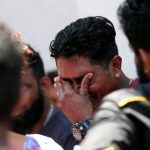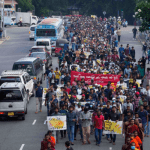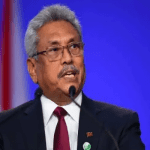Sri Lanka’s Parliament has passed a proposed measure to regulate online content, prompting allegations from rights groups and opposition politicians that the government is attempting to suppress dissent and limit free expression ahead of the legislative and presidential elections this year.
The speaker declared that the measure passed with a vote of 108-62 on Wednesday.
Content makers who a five-member commission finds to be posting “illegal” information might face jail time under the terms of the Online Safety Bill. Additionally, it holds internet giants like Google, Facebook, and X responsible for information published on their networks.
The administration of President Ranil Wickremesinghe stated that the measure was intended to combat cybercrimes, such as child abuse, data theft, and online fraud. It was only brought before the assembly for a vote on Wednesday.
The country logged 8,000 cybercrimes last year, said Public Security Minister Tiran Alles, who denied the legislation would impact freedom of speech.
Human Rights Watch criticised the bill, warning that members of the Online Safety Commission would have arbitrary powers to “decide what online speech is ‘false’ or ‘harmful’, remove content, restrict and prohibit internet access, and prosecute individuals and organizations”.
Offenses under the bill carry hefty fines and prison sentences of up to five years, the international rights group said.
Sri Lanka’s Parliament has passed a proposed measure to regulate online content, prompting allegations from rights groups and opposition politicians that the government is attempting to suppress dissent and limit free expression ahead of the legislative and presidential elections this year.
The speaker declared that the measure passed with a vote of 108-62 on Wednesday.
Content makers who a five-member commission finds to be posting “illegal” information might face jail time under the terms of the Online Safety Bill. Additionally, it holds internet giants like Google, Facebook, and X responsible for information published on their networks.
The administration of President Ranil Wickremesinghe stated that the measure was intended to combat cybercrimes, such as child abuse, data theft, and online fraud. It was only brought before the assembly for a vote on Wednesday.
The country logged 8,000 cybercrimes last year, said Public Security Minister Tiran Alles, who denied the legislation would impact freedom of speech.
Human Rights Watch criticised the bill, warning that members of the Online Safety Commission would have arbitrary powers to “decide what online speech is ‘false’ or ‘harmful’, remove content, restrict and prohibit internet access, and prosecute individuals and organizations”.
Offenses under the bill carry hefty fines and prison sentences of up to five years, the international rights group said.
Sri Lanka’s Parliament has passed a proposed measure to regulate online content, prompting allegations from rights groups and opposition politicians that the government is attempting to suppress dissent and limit free expression ahead of the legislative and presidential elections this year.
The speaker declared that the measure passed with a vote of 108-62 on Wednesday.
Content makers who a five-member commission finds to be posting “illegal” information might face jail time under the terms of the Online Safety Bill. Additionally, it holds internet giants like Google, Facebook, and X responsible for information published on their networks.
The administration of President Ranil Wickremesinghe stated that the measure was intended to combat cybercrimes, such as child abuse, data theft, and online fraud. It was only brought before the assembly for a vote on Wednesday.
The country logged 8,000 cybercrimes last year, said Public Security Minister Tiran Alles, who denied the legislation would impact freedom of speech.
Human Rights Watch criticised the bill, warning that members of the Online Safety Commission would have arbitrary powers to “decide what online speech is ‘false’ or ‘harmful’, remove content, restrict and prohibit internet access, and prosecute individuals and organizations”.
Offenses under the bill carry hefty fines and prison sentences of up to five years, the international rights group said.
Sri Lanka’s Parliament has passed a proposed measure to regulate online content, prompting allegations from rights groups and opposition politicians that the government is attempting to suppress dissent and limit free expression ahead of the legislative and presidential elections this year.
The speaker declared that the measure passed with a vote of 108-62 on Wednesday.
Content makers who a five-member commission finds to be posting “illegal” information might face jail time under the terms of the Online Safety Bill. Additionally, it holds internet giants like Google, Facebook, and X responsible for information published on their networks.
The administration of President Ranil Wickremesinghe stated that the measure was intended to combat cybercrimes, such as child abuse, data theft, and online fraud. It was only brought before the assembly for a vote on Wednesday.
The country logged 8,000 cybercrimes last year, said Public Security Minister Tiran Alles, who denied the legislation would impact freedom of speech.
Human Rights Watch criticised the bill, warning that members of the Online Safety Commission would have arbitrary powers to “decide what online speech is ‘false’ or ‘harmful’, remove content, restrict and prohibit internet access, and prosecute individuals and organizations”.
Offenses under the bill carry hefty fines and prison sentences of up to five years, the international rights group said.
Sri Lanka’s Parliament has passed a proposed measure to regulate online content, prompting allegations from rights groups and opposition politicians that the government is attempting to suppress dissent and limit free expression ahead of the legislative and presidential elections this year.
The speaker declared that the measure passed with a vote of 108-62 on Wednesday.
Content makers who a five-member commission finds to be posting “illegal” information might face jail time under the terms of the Online Safety Bill. Additionally, it holds internet giants like Google, Facebook, and X responsible for information published on their networks.
The administration of President Ranil Wickremesinghe stated that the measure was intended to combat cybercrimes, such as child abuse, data theft, and online fraud. It was only brought before the assembly for a vote on Wednesday.
The country logged 8,000 cybercrimes last year, said Public Security Minister Tiran Alles, who denied the legislation would impact freedom of speech.
Human Rights Watch criticised the bill, warning that members of the Online Safety Commission would have arbitrary powers to “decide what online speech is ‘false’ or ‘harmful’, remove content, restrict and prohibit internet access, and prosecute individuals and organizations”.
Offenses under the bill carry hefty fines and prison sentences of up to five years, the international rights group said.
Sri Lanka’s Parliament has passed a proposed measure to regulate online content, prompting allegations from rights groups and opposition politicians that the government is attempting to suppress dissent and limit free expression ahead of the legislative and presidential elections this year.
The speaker declared that the measure passed with a vote of 108-62 on Wednesday.
Content makers who a five-member commission finds to be posting “illegal” information might face jail time under the terms of the Online Safety Bill. Additionally, it holds internet giants like Google, Facebook, and X responsible for information published on their networks.
The administration of President Ranil Wickremesinghe stated that the measure was intended to combat cybercrimes, such as child abuse, data theft, and online fraud. It was only brought before the assembly for a vote on Wednesday.
The country logged 8,000 cybercrimes last year, said Public Security Minister Tiran Alles, who denied the legislation would impact freedom of speech.
Human Rights Watch criticised the bill, warning that members of the Online Safety Commission would have arbitrary powers to “decide what online speech is ‘false’ or ‘harmful’, remove content, restrict and prohibit internet access, and prosecute individuals and organizations”.
Offenses under the bill carry hefty fines and prison sentences of up to five years, the international rights group said.
Sri Lanka’s Parliament has passed a proposed measure to regulate online content, prompting allegations from rights groups and opposition politicians that the government is attempting to suppress dissent and limit free expression ahead of the legislative and presidential elections this year.
The speaker declared that the measure passed with a vote of 108-62 on Wednesday.
Content makers who a five-member commission finds to be posting “illegal” information might face jail time under the terms of the Online Safety Bill. Additionally, it holds internet giants like Google, Facebook, and X responsible for information published on their networks.
The administration of President Ranil Wickremesinghe stated that the measure was intended to combat cybercrimes, such as child abuse, data theft, and online fraud. It was only brought before the assembly for a vote on Wednesday.
The country logged 8,000 cybercrimes last year, said Public Security Minister Tiran Alles, who denied the legislation would impact freedom of speech.
Human Rights Watch criticised the bill, warning that members of the Online Safety Commission would have arbitrary powers to “decide what online speech is ‘false’ or ‘harmful’, remove content, restrict and prohibit internet access, and prosecute individuals and organizations”.
Offenses under the bill carry hefty fines and prison sentences of up to five years, the international rights group said.
Sri Lanka’s Parliament has passed a proposed measure to regulate online content, prompting allegations from rights groups and opposition politicians that the government is attempting to suppress dissent and limit free expression ahead of the legislative and presidential elections this year.
The speaker declared that the measure passed with a vote of 108-62 on Wednesday.
Content makers who a five-member commission finds to be posting “illegal” information might face jail time under the terms of the Online Safety Bill. Additionally, it holds internet giants like Google, Facebook, and X responsible for information published on their networks.
The administration of President Ranil Wickremesinghe stated that the measure was intended to combat cybercrimes, such as child abuse, data theft, and online fraud. It was only brought before the assembly for a vote on Wednesday.
The country logged 8,000 cybercrimes last year, said Public Security Minister Tiran Alles, who denied the legislation would impact freedom of speech.
Human Rights Watch criticised the bill, warning that members of the Online Safety Commission would have arbitrary powers to “decide what online speech is ‘false’ or ‘harmful’, remove content, restrict and prohibit internet access, and prosecute individuals and organizations”.
Offenses under the bill carry hefty fines and prison sentences of up to five years, the international rights group said.














